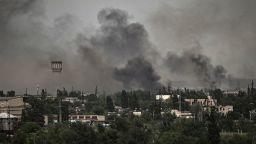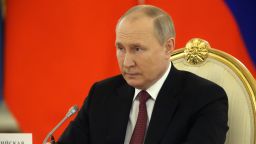Russia is not standing in the way of Ukrainian grain exports, President Vladimir Putin said, calling such accusations a “bluff” in an interview with the state TV channel “Russia-1.”
“This is a bluff. And I will explain why. The world produces about 800 million tons of wheat per year. We are told that Ukraine is ready to export 20 million tons. It’s only 2.5%,” Putin said in an interview.
Some background: Leaders around the world have been sounding the alarm as Russia’s months-long blockade of Ukrainian ports is increasing the risk of a global food crisis and famine in some parts of the world.
Two weeks after Russia invaded Ukraine, the prices of key agricultural products produced in the region have skyrocketed. The biggest problem is wheat, a pantry staple. Supplies from Russia and Ukraine, which together account for almost 30% of global wheat trade, are now at risk. Global wheat prices hit an all-time high earlier this week.
At the same time, Russia also appears to be ramping up its efforts to steal large quantities of Ukrainian grain, as CNN has previously reported. Russian forces are also stealing farm equipment and thousands of tons of grain from Ukrainian farmers in areas they have occupied, as well as targeting food storage sites with artillery, multiple sources have told CNN.
Russian units have tightened their grip on parts of the rich agricultural regions of Kherson and Zaporizhzhia in southern Ukraine, the sources said. Sowing operations in many areas have since been disrupted or abandoned.
“We do not prevent the export of Ukrainian grain. It can be exported through ports that are under the control of Ukraine,” Putin said.
“But we did not mine the approaches to the ports! Ukraine did. I have already said many times: let them clear the mines and let ships with grain go out,” he said. “We guarantee their passage without any problems.”
Ukraine has accused the Russians of placing mines in the Black Sea.
Putin also suggested that the Ukrainian grain should be exported through Belarus, Romania, Hungary, and Poland, but any traffic through Belarus would involve the West lifting sanctions against its government, which is Russia’s closest ally.
Putin also said that Russia has almost completed demining of the Ukranian ports under its occupation.
“There is another possibility (for the export of grain). These are through the ports of the Sea of Azov - Berdyansk, Mariupol which are under our control. We are ready to ensure the smooth export, including Ukrainian grain, through all these ports,” Putin told “Russia-1” state TV channel.
“We are already completing mine clearance that Ukrainian troops have mined there. The work is being completed, we will create the necessary logistics,” Putin said.
This week, for the first time since the Russian invasion, a merchant ship left Mariupol for the Russian port of Rostov-on-Don.
Putin also said that Russia is ready to increase its own grain exports to 50 million tons in 2022-2023.
“In the current agricultural year 2021-2022, we will export 37 million tons of grain, and for 2022-2023, I think we will raise this export to 50 million tons,” he said in an interview with a state TV channel.

































